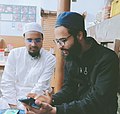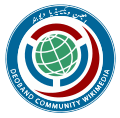Deoband Community Wikimedia/Events/Movement Charter Discourses
The Deoband Community Wikimedia conducted a series of Movement Charter discourses as a part of the Movement Charter Ambassadors Program, targeting at the representation of DCW and the Indic-Urdu community in the Movement-wide Movement Charter consultations and feedbacks.
These discourses took place between 20 November and 16 December 2022 and were supported with a Movement Strategy Implementation grant of 1508 USD. The grant proposal was used as a standard example by the Movement Strategy team in its Movement Charter Ambassadors kick-off convo on 17 November 2022.
Program details
[edit]Translations
[edit]The following pages have been translated into Urdu language as the program's first task.
- Movement Strategy and Governance/Movement Charter Ambassadors Program/About
- Movement Strategy and Governance/Movement Charter Ambassadors Program/FAQ
- Movement Strategy and Governance/Movement Charter Ambassadors Program/Join
- Movement Strategy and Governance/Movement Charter Ambassadors Program/Conversations
- Movement Strategy and Governance/Movement Charter Ambassadors Program/grant
- Template:Movement Charter/Header
- Movement Charter/Community Consultation
- Movement Charter
- Movement Charter/Drafting Committee/Updates
 Doing...
Doing... - Movement Charter/Content/Preamble
- Movement Charter/Content/Values & Principles
- Movement Charter/Content/Roles & Responsibilities
- Template:Movement Charter/Sidemenu
- Template:Movement Charter draft
- Movement Charter/Content
- Movement Charter/Drafting Committee
- Movement Strategy and Governance/Movement Charter Ambassadors Program/resources
- Movement Charter survey
- Hubs
- Hubs/Events
- Template:Hubs/Header
- Hubs/Updates
- Template:Hubs updates
- Movement Strategy/Updates/2022/July
Meetings
[edit]The main part of the Ambassador program is to have conversations with our community and have their voices heard. As such, several in-person meetings have been done in New Delhi, including those with the program researcher and advisor. The community was represented in the South Asian regional consultation call by TheAafi. The rough outline is stated below:
-
DCW volunteer reading Movement Chart Urdu language draft alongside having a cup of tea
-
DCW and Indic-Urdu Wikimedia community MC discourses in Hyderabad 09-12-2022
-
DCW and Indic-Urdu Wikimedia community MC discourses in Hyderabad 10-12-2022
-
DCW Movement Charter conversations in Deoband on 12-12-2022
-
DCW Movement Charter conversation in Deoband 13-12-2022
- 27 November 2022, offline meeting with our researcher Muntaqibah
- 28 November 2022, our researcher's online call with MSG facilitator CSinha.
- 30 November 2022, an offline meeting with one of our advisors, DilliKiShaam, a researcher scholar at Jamia Millia Islamia.
- 2 December 2022, participation in Movement Charter: South Asia Regional Consultation
- 3 December 2022, an online meeting with Akbarali on different aspects of our Movement Charter Ambassador Program.
- 4 December 2022, an in-person meeting with Muhammad Aqeel, a postgraduate research scholar, to seek feedback on the Movement Charter, subject to DCW's themes and ideas.
- 6 December 2022, an in-person meeting with ShadabAkhtar0786
- Hyderabad offline meetings between 9 and 11 December. Joined by Faismeen, Hindustanilanguage and Omran Ali
- An in-person meet at Deoband on 12 December 2022.
- An online call with Ciell, a member of the Movement Charter Drafting Committee has been scheduled to take place on Thursday, 15 December 2022. (07:00 PM to 08:00 PM IST)
- 16 December 2022: Final intracommunity consultation call (online) at 07:00 PM to 08:00 PM IST.
-
DCW Movement Charter conversations in Deoband, 13-12-2022
-
DCW volunteer expressing his ideas on Movement Charter
-
DCW Movement Charter conversation with Ciell on 15-12-2022
Outcomes and learnings
[edit]The preliminary research indicated some issues on which we focused in almost all of our conversations. These issue indicated the necessity of having a Movement Charter. The DCW and Indic-Urdu community thinks that the Charter will give voice to our unheard heartily desires that we have for our projects and themes. This is likewise described by Faiz Ahmad Faiz in one of his poems. He goes on to say,
Speak, your lips are free.
Speak, it is your own tongue.
Speak, it is your own body.
Speak, your life is still yours.
Our research pointed out the need of having a document that describes and defines our roles and responsibilities, values and principles, ideas and and goals - for having a well-defined globally spread people-centered movement. The possible arenas of interest that the research pointed out to include: over and excessive bureaucratic behavior, underrepresentation of our theme and projects, less support to our projects (subject to Equity) likely due to regulatory concerns. These points were prioritized whilst discussion and gaining feedback on the Movement Charter draft content.
The general feedback received is summarized below, and the detailed feedback is available here.
- The "movement", at the least "we", need a Charter that governs us.
- We should know what "rules" us i.e. the document should be enough simple that it is not difficult to understand.
- If we opt to abide by the "translated version of the Charter", it should be validated, and as such it requires a support from the MCDC.
- The current draft of the Charter, the available chapters, have sections that are difficult to understand.
- If we do not understand the Charter - how are we going to apply it at a broader level?
- The MCDC should consult language experts - from within the community and seek their opinions, if the "Charter" is going to be applicable through out all of the communities. This might help in its simplification.
- Certain difficult words need to remain there and those should be explained in footnotes. This Charter is not like a Constitution of a federal state i.e. it does not govern a single country or community. It is expected to govern a global movement and it must be "much understandable" that it is understood globally.
- The Ambassador's Program was started all of a sudden and the process of feedback was made difficult. What is the value and status of a cursory opinion and comment? If the Movement Charter is such high-level and movement-wide most important document, a few days or weeks are very less to give a feedback on it. Things done this way do not bring a good result.
- Preamble has sections that are completely difficult to understand. Several advanced sentences should be cut down into simpler sentences.
- Has the MCDC been influenced by "corporate-world" when making a draft for Values and Principles?
- In the South Asian Regional Conversation Call, it was said that we need feedback on content but we do not have any available content for Roles and Responsibilities, what do we give our feedback on. There is not anything there but I look forward to the content, said a participant in one of the meetings.
Leads
[edit]The intracommunity discourses were led by TheAafi and the program lead was Yop Rwang Pam, who serves as the Movement Strategy Implementation Specialist at Wikimedia Foundation. The preliminary research indicated in the grant proposal was done by Muntaqibah, and DilliKiShaam served as an advisor. CSinha was a regional MSIG lead for this program.
Detailed feedback
[edit]The feedback collected throughout this course of work has been cited fourteen times in the Movement Charter Community Consultation detailed feedback.








